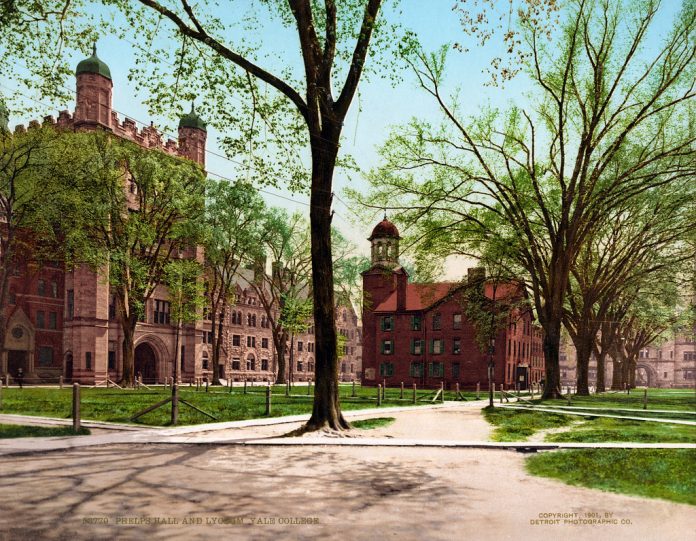Yale University employs more than three administrators and support staff for every four undergraduate students – roughly one administrator per undergrad, according to a College Fix analysis.
Over the last decade, Yale added 631 administrators and support staff to its payroll, according to data provided by administrators to the federal Integrated Postsecondary Education Data System.
As the university embraced new DEI efforts, the number of administrators and support staff increased by 13 percent, from 4,942 to 5,573, between 2013-14 and 2021-22, the analysis found.
During this period, the number of full-time undergraduates at Yale increased by about 20 percent, from 5,424 to 6,532. Meanwhile, the number of teaching and instructional positions compared to students decreased by about 6 percent, from 403 per 1,000 to 379 educators per 1,000.
Under the analysis, administrators and support staff include management, student and academic affairs divisions, IT, public relations, administrative support, maintenance, and legal and other non-academic departments.
The growth of administrators and support staff at Yale can be linked in some part to its efforts to grow DEI on campus. Yale’s DEI diversity initiative included a hiring program that aimed to diversify the campus by creating faculty search committees and hosting implicit bias workshops.
“The percentage of Yale managers and professionals from historically underrepresented minority groups has more than doubled in the past decade,” President Peter Salovey wrote to the campus community in October 2020.
But Salovey pledged to do more, and the campus continued to grow DEI efforts after the university pledged $135 million for a diversity initiative in 2020 and moved forward with implementing DEI offices in schools across the campus in 2022.
For example, in 2021, the Yale Child Study Center created a chief diversity officer position. In 2022, the Yale School of Art created a new position: Director of Sustainable Equity and Inclusion. In 2023, Yale’s Cancer Center hired a DEI director to increase efforts to hire faculty of color.
Yale’s Interim Vice President for Communications Karen Peart did not respond to emails from The Fix over the last two months asking how many new administrators and support staff the university hired to support its DEI initiatives.
The Fix found 94 named DEI officials across 10 of Yale’s 19 schools. Numbers varied widely, with only one DEI official reported at the School of Architecture but 45 DEI officials at the School of Medicine’s Diversity Advisory Council.
Yale employs one DEI official in its public health school, three in its music school, three in its environment school, four in its nursing school, four in its divinity school, and 11 in its drama school. Yale also employed five university-wide DEI officials and 17 at its undergraduate school.
The Diversity Advisory Council has five vice chairs for DEI as well as a director of justice, equity, diversity and inclusion; an associate dean for gender equity and deputy chair for DEI; an associate dean for diversity, equity, inclusion and belonging; a faculty director of workforce development and diversity; three directors of DEI; a vice chief for DEI; a chief diversity officer; and a departmental director for DEI.
The remaining members of the Diversity Advisory Council have no DEI-specific titles but help the council in its mission of “disseminating DEI-related best practices . . . and enabling department chairs to implement the YSM Diversity Strategic Plan.”
Asked for comment on Yale’s DEI hiring, conservative scholar Heather Mac Donald* said that adding more bureaucrats, diversity or otherwise, will not solve a non-existent racism problem at the school, but it will drive up its “already exorbitant” tuition.
“Faculty bias does not stand in the way of greater black and Hispanic representation among the Yale professoriate,” she said via email. “The dearth of qualified minorities in the hiring pipeline is the problem, whether in STEM or in the hard social sciences.”
“Every college in the country is desperately chasing the same small pool of competitively qualified black and Hispanic Ph.D.’s,” she said. “There is an arms race in salary offers; part of Yale’s latest gargantuan diversity allocation will go to outbidding other schools for the same inadequate supply of satisfactorily diverse faculty faces. This is a grotesque waste of money.”
But, she added, the growth of DEI bureaucrats is not the only problem.
“Conservative critics of higher education risk overstating the importance of official DEI bureaucrats in creating today’s left-wing campus orthodoxies. The faculty, curriculum, and the students themselves are equally to blame,” she said.
“A university’s mission is not to fight alleged racism or other claimed social ills; it is to pass on a cultural inheritance and to create new knowledge through the rigorous testing of hypotheses and evidence,” she said. “Such testing can occur only in an environment of epistemological openness, not in one of ideological conformity. Yes, DEI bureaucrats can enforce such conformity, but so can other actors within a university.”
Editor’s note: Heather Mac Donald is a member of The College Fix advisory board.
Originally published by The College Fix. Republished with permission.
For more great content from School Reform News.
For more from The Heartland Institute.










